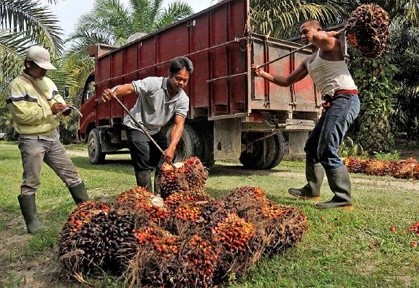Popular Reads
Top Results
Can't find what you're looking for?
View all search resultsPopular Reads
Top Results
Can't find what you're looking for?
View all search resultsIndonesia ups efforts to gain EU recognition for palm oil
Change text size
Gift Premium Articles
to Anyone
I
ndonesia is stepping up its efforts to gain recognition from the European Union for a palm oil product certification amid an intense anti-palm oil campaign in Europe on the back of sustainability concerns.
The government planned to develop a palm oil legality scheme, similar to its domestic timber legality system (SVLK) implemented in 2013, which has gained recognition as the world’s only timber legality scheme acknowledged by the EU. The legality scheme for palm oil is expected to improve the reputation of the country’s palm oil industry, Environment and Forestry Minister Siti Nurbaya Bakar said.
“Because the palm oil industry is constantly protested internationally for allegedly creating problems, we have to find instruments that are internationally accepted,” she said on Wednesday.
The government has issued its own national sustainability standards for palm oil, called Indonesian Sustainable Palm Oil (ISPO), which certifies legal compliance. However, five years into its implementation, it has failed to gain access to premium EU markets. “ISPO has not been accepted internationally yet. That’s what we have to improve,” Siti said, adding that her ministry, under the Coordinating Economic Ministry, had started the discussion.
Deputy for food and agricultural coordination at the Office of the Coordinating Economic Minister Musdhalifah Machmud said the first step toward positive international recognition for palm oil included cooperating with the EU through the Working Group on Environment and Climate Change (WGECC), which was set up by both parties during a meeting in Brussels in November 2016.
Through the working group, Indonesia aimed to repeat the success of SVLK, which was approved by all 28 EU members for complying with the EU’s Forest Law Enforcement Governance and Trade (FLEGT), a set of regulations that guarantee that timber has been harvested, processed and exported in accordance with certain laws, she said.
“The working group may consider expanding similar legality schemes on other commodities, palm oil in particular,” Musdhalifah said.
(Read also: ANALYSIS: Maintaining CPO’s competitive advantages)
She regretted that European countries were using environmental issues as non-tariff barriers for incoming palm oil products in order to protect their rapeseed oil producers.
It is questionable, she said, as the European rapeseed producers had no obligation to obtain sustainability certifications, but the EU continued to raise concerns about Indonesia’s palm oil products.
The working group held its first meeting in Jakarta on Wednesday in the Environment and Forestry Ministry Office where participants discussed various issues where the EU and Indonesia had common interests, such as climate change, biodiversity and circular economy.
European Commissioner for Environment, Maritime Affairs and Fisheries Karmenu Vella welcomed the cooperation of Indonesia to develop a legal scheme for palm oil products. He added that Indonesia and the EU had a lot of common ground to work toward a blue and green economy.
“We are very interested to see what’s happening not only in Indonesia but everywhere. Indonesia is a major player in palm oil. The EU working group is the right forum where this could be discussed,” Vella said.










